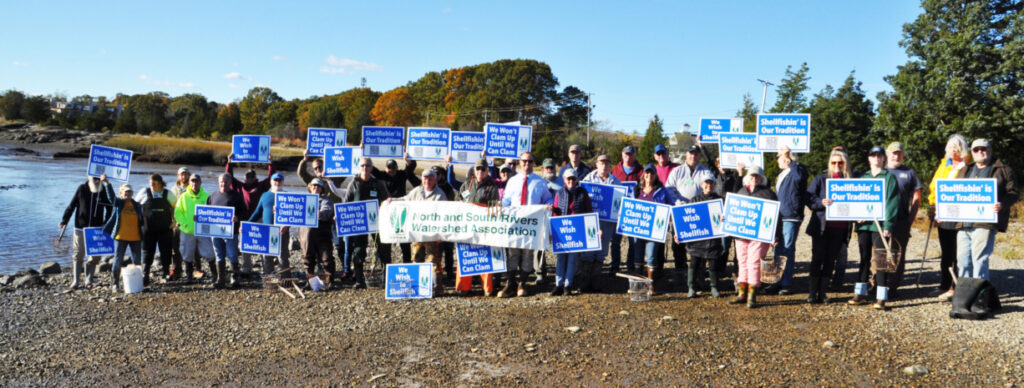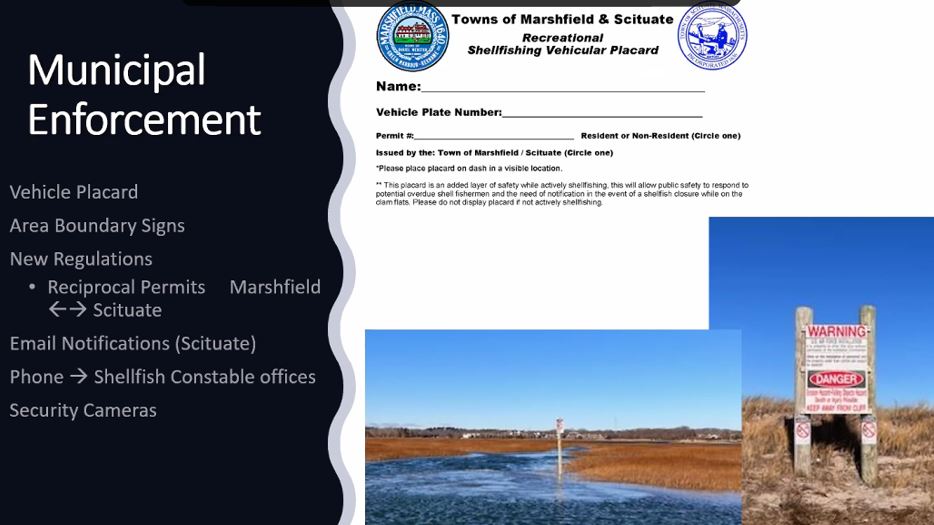 Shellfishin’ is still our tradition! After 2 ½ seasons of not being able to shellfish in our rivers, a portion of the shellfish beds will finally be reopened on January 1, 2023! At a meeting on December 13, 2022, the Scituate Shellfish Advisory Committee and the Massachusetts Division of Marine Fisheries (DMF) presented the findings of a dilution study and water quality sampling results from the Scituate Wastewater Treatment plant that will allow approximately 46-61% of the formerly open shellfish bed area in the North and South Rivers to be reopened. Our thanks to all who have signed petitions, emailed their legislators, attended public meetings, and our shellfish sit-ins. Your collective voices have been instrumental in getting this reopening to happen! Particular thanks go to Representative Patrick Kearney and Senator Patrick O’Connor for securing funding for the studies which led to the reopening. And to our own David Dauphine and Shellfish Warden Mike DiMeo, both avid clammers who have advocated for all of us to be able to harvest our own food.
Shellfishin’ is still our tradition! After 2 ½ seasons of not being able to shellfish in our rivers, a portion of the shellfish beds will finally be reopened on January 1, 2023! At a meeting on December 13, 2022, the Scituate Shellfish Advisory Committee and the Massachusetts Division of Marine Fisheries (DMF) presented the findings of a dilution study and water quality sampling results from the Scituate Wastewater Treatment plant that will allow approximately 46-61% of the formerly open shellfish bed area in the North and South Rivers to be reopened. Our thanks to all who have signed petitions, emailed their legislators, attended public meetings, and our shellfish sit-ins. Your collective voices have been instrumental in getting this reopening to happen! Particular thanks go to Representative Patrick Kearney and Senator Patrick O’Connor for securing funding for the studies which led to the reopening. And to our own David Dauphine and Shellfish Warden Mike DiMeo, both avid clammers who have advocated for all of us to be able to harvest our own food.
The shellfish beds were closed in 2020 because of new National Shellfish Sanitation Program rules which closed the harvest of shellfish beds within a 1000:1 dilution area around wastewater treatment plant discharge, due to concerns that viruses may be discharged into the water from wastewater treatment plants. The dilution closure area was not based on the actual measured quality of the wastewater treatment plant effluent in our rivers nor the hydrodynamics of our rivers. It was a nationwide policy which we believe is really meant to govern the commercial sale of shellfish, not recreationally harvested shellfish. Since the closures, the NSRWA has advocated for a separation of recreational from commercial shellfishing standards, as well as for testing Scituate’s treatment plant effluent and modeling the flushing characteristics of our own rivers. We haven’t been able to convince the state to separate recreational and commercial shellfishing rules but we have been successful in getting the state to pay for, and conduct, testing to identify if we have a virus problem.
 The results from a year-long study of the water quality show that the Scituate treatment plant regularly emits very clean effluent. Fortunately, thanks in part to the NSRWA’s long-term advocacy, the Scituate Wastewater Treatment plant uses ultraviolet, or UV radiation, in its treatment process. Testing of the treated effluent showed a drastic reduction – to below detectable levels in most samples – of viruses. These excellent results are allowing the state to reduce the dilution standard to 300:1. A flushing model of our rivers was developed to show the line at which the wastewater effluent, on average, reaches a 300:1 dilution rate. (See diagrams left for new closure areas.) The closure area will change from winter to spring, with a small area of the South River, which is open from November through February, being closed March through May due to changing flushing conditions.
The results from a year-long study of the water quality show that the Scituate treatment plant regularly emits very clean effluent. Fortunately, thanks in part to the NSRWA’s long-term advocacy, the Scituate Wastewater Treatment plant uses ultraviolet, or UV radiation, in its treatment process. Testing of the treated effluent showed a drastic reduction – to below detectable levels in most samples – of viruses. These excellent results are allowing the state to reduce the dilution standard to 300:1. A flushing model of our rivers was developed to show the line at which the wastewater effluent, on average, reaches a 300:1 dilution rate. (See diagrams left for new closure areas.) The closure area will change from winter to spring, with a small area of the South River, which is open from November through February, being closed March through May due to changing flushing conditions.
North and South Rivers proposed open and closed areas: Red = closed areas, Blue = open areas, Blue cross-hatch = area open March through May.
In addition to the January 1 reopening, there are some administrative changes being made which will make it easier for residents to shellfish.
- There will be reciprocity between Marshfield and Scituate, meaning if you have a Marshfield license it will be honored in Scituate and vice versa, avoiding the need to purchase two licenses. The towns are working on online licensing applications for the 2023-2024 season.
- Veterans may obtain a license at no cost.
- Shellfishing will be open 7 days a week, and you may sign up for email notifications of any changes.
- A placard will be provided to place in your car while you are shellfishing, and the towns have posted signage to indicate where the closure areas are located.
 These regulation changes should be before each town’s select boards next week – Scituate December 20 and Marshfield December 19 – for approval, if you would like to attend and provide input.
These regulation changes should be before each town’s select boards next week – Scituate December 20 and Marshfield December 19 – for approval, if you would like to attend and provide input.
We are very excited that a good portion of the shellfish beds will be re-opened to the public so they can access and harvest shellfish again, but we are not fully satisfied with the results. In particular, the area behind the Spit will be closed to shellfishing permanently due to its proximity to the discharge outfall – “to be safe”. This area is one of just a handful of areas that can be accessed by foot instead of boat, is an area very rich in soft shell clams, and represents a real loss to accessing the shellfish beds. We will continue to advocate to the DMF for an expansion of the shellfishing season to open in September instead of November, and to reduce the dilution area given how clean the effluent results are at present. But for now, let’s take our win and celebrate by clamming next year!
Here’s a link to an article that summarizes where we stand currently https://www.nsrwa.org/shellfishing-sit-in-shows-we-wish-to-shellfish/
And some background articles –
https://www.nsrwa.org/protect-our-waters/healthy-rivers/shellfish-beds/
https://www.nsrwa.org/shellfish-beds-closed-indefinitely-in-north-and-south-rivers/
To watch the entire presentation please visit the Scituate Community TV YouTube Channel

